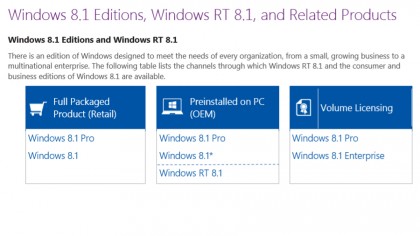Everything you ever wanted to know about Windows licensing
Navigating the minefield of OS licensing
If you see exceptionally cheap versions of Windows for sale, they're unlikely to be legitimate. They might be second-hand or even pirated – and if your business ever gets audited, you'll have to pay a fine as well as paying for new licences. And when you buy a new PC, you'll want to check what version of Windows it comes with before you pay for it.
The cheap Bing versions of Windows are only for devices with small screens (10.1-inch and 8-inch). If you see them on a larger system – or on a device like a PC stick with no screen – then the OEM is breaking the rules. Microsoft is likely to stop the OEM when they find out what they're doing (and their suggestion if you buy a PC with an invalid version of Windows, is to return it for a refund, or pay for a proper licence).

If someone – like a local computer shop – is building a PC for you, it might come with a System Builder OEM licence – the rights you get with that are like any other OEM copy of Windows. The System Builder OEM licence costs the PC builder more than an OEM licence costs a large PC maker (so it might cost you more), but they can just buy licences when they need them and don't have to work as closely with Microsoft as the main OEMs do.
And if you're building a PC yourself you can buy a System Builder licence for Windows 8 or Windows 8 Pro (but not Windows 7) with what Microsoft calls the Personal Use Licence and then get the free upgrade to Windows 8.1 (and to Windows 10).
On trial
Few if any PC makers offer trial versions of Windows with new PCs anymore – Microsoft seems to have discouraged this. You can legally buy a PC with no Windows licence at all and buy your own copy of Windows separately but it will work out more expensive (and you can't use a Windows Enterprise volume licence for that, unless you have a retail copy of Windows Pro to upgrade from).
And while you could buy a PC with no OS and load the trial versions of Windows that Microsoft makes available for download, these are only meant for evaluating Windows, not for actually using it. You'd have to reformat and reinstall Windows when the trial ran out, and if your business got audited, again you'd have to pay a fine as well as paying for a real licence.
Microsoft, the Federation Against Software Theft (FAST) and even Trading Standards are increasingly ready to go after businesses who use unlicensed software, so in the end, rather than save you money, this route could end up to be very expensive.
Sign up to the TechRadar Pro newsletter to get all the top news, opinion, features and guidance your business needs to succeed!
Mary (Twitter, Google+, website) started her career at Future Publishing, saw the AOL meltdown first hand the first time around when she ran the AOL UK computing channel, and she's been a freelance tech writer for over a decade. She's used every version of Windows and Office released, and every smartphone too, but she's still looking for the perfect tablet. Yes, she really does have USB earrings.